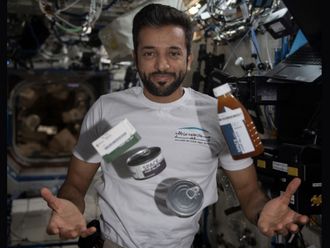New York: Cockatoos are smart birds, and the Goffin’s cockatoos in a Vienna lab are among the smartest. In an experiment reported about a year ago, they turned out to be real stars at making tools from a variety of materials in order to get a treat.
In a new study, researchers tested the birds’ ability to match shapes using an apparatus reminiscent of a child’s toy. The birds had to put a square tile into a square hole and more complicated, asymmetrical shapes into matching holes. If they were successful, they got a treat.
Cornelia Habl, a master’s student at the University of Vienna, and Alice M.I. Auersperg, a researcher at the University of Veterinary Medicine in Vienna, ran several experiments. They reported in the journal PLOS One that the cockatoos were not only able to match the shapes to the holes, but did much better than monkeys or chimpanzees.
“It was thought to be an exclusively human ability for a long time,” Habl said. Tests of matching shapes are used to mark milestones in child development.
Babies can put a sphere into the right hole at age 1, but they can’t place a cube until age 2. From there, they continue to improve.
Some primates can do similar tasks, although they need a lot of basic training to get up to speed before they can use the experimental apparatus, called a key box.
The birds jumped right in without any training and excelled. “Compared to primates, the cockatoos performed very well,” Habl said.
Why are they so good? In the wild, they have not been observed using tools. But they are generalists, foragers who take whatever food they can find.
They are adaptable enough to do well in some urban areas in Australia, Habl said. To succeed in a variety of environments eating a variety of foods, “they have to be very, very flexible.”
They are so flexible that they managed to go outside the parameters of the experiment to get a treat. In a video, one bird tears a splinter off a chair and uses it to open the apparatus without matching a shape to a hole.
“They did figure out a couple of ways to trick the box,” Habl said. “But it was not counted as successful because it was not what I wanted them to do.”
Just as in human life, the students who were so smart they could game the test did not get good marks because they did not follow the rules.
Working with the birds, said Habl, can be rewarding. “They surprise you every day,” she said. “Sometimes they outsmart me.”
“They are escape artists,” she said, and don’t make good pets. “They are very, very exhausting in a home environment.”












